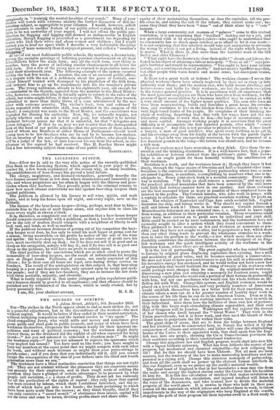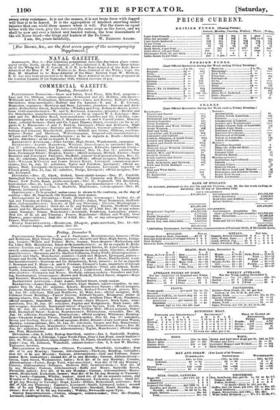THE SOURCES OF STRIKES.
1 Adam Street, Adelphi, 5th December 1853.
Sin—The strikes in the North appear about to end as most strikes do, not in a peaceful adjustment, but in the discomfiture of the weakest—the men without capital. It would be better if they ended in their mental conviction, without irritating compulsion and the inward resolve to "try again." The cloud-compelling fovea, who wield mills and money and sometimes grey goose quills and steel gads in public journals, and many of whom have been workmen themselves, vituperate the workmen loudly for their ignorant im- patience and want of political economy.; but the workmen might fairly answer them, as the drunkard did the sophist of old when reproved for being drunk—" Are you not ashamed to admonish a drunken man ?" So might the workmen reply—" Are you not ashamed to reprove the ignorance which your neglect has caused? You have used us like tools; you have sought to keep our numbers at the exact point that we might compete with each other for work, and without such increase as might draw your purse-strings in Parish-rates; and if you deny that you individually did it, still you cannot escape the oonsequences of the sins of your fathers unto the third and fourth generation more than we can."
The workmen have a blind instinctive conviction that things are not right yet. They are not content without the pleasures they are conscious money can procure for their employers, and in their rough mode of settling the question they have a glimpse of certain advantages to be procured by what people call socialism, i. C. a share of profits. They do not ask too cunously for all the particulars of the rights of capital : they only know that capital has been created by labour, which their forefathers fore ished, and the re- sults of whiell have got into a few hands ; the heads pertaining to which have been more acute than the masses; so they think broadly, that if they can only contrive a "sacred month" of abstinence from labour, capital will gee its error and come to terms, dividing profits share and share alike. The equity of their maintaining themselves, as does the capitalist, till the pro- fits come in, and taking the risk bf the return, they cannot make out ; be- cause they think they have been " done" out of their share by a "cute" bargain.
When a large community not maaters of " palaver" come to this mutual conviction, it is not surprising that "intellect" looking out for a job, and not provided with it by shortsighted rulers—who ought to understand that no community has so much spare intellect as to afford to let it run waste— it is not surprising that this intellect should take suit and service to advocate the wrong by which it can get a living, instead of the right which leaves it to starve. What is there in _this more than the barrister work at the Old Bailey and older Chancery ? " What right have the masters to close their mills ?" shouts out labour, de- feated in his object of attaining a labour monopoly. "None at all ! " says peo- ple's barrister and would-be representative. " You ought to have your rations certain, and a contingent share of profits." And not merely harritter says this, but other people with warm hearts and moral sense, but discrepant brains, echo it.
Is there not a great truth at bottom? The working classes—I mean the physical workers—have been utterly neglected by those set or risen up into authority over them ; and the modern race, who build decent dwellings and lecturc-roorns and baths for their workmen, are but the modern exception to the former general practice. It is in accordance with all experience that the most ignorant employers are those who have risen from workmen, for the process of mere accumulation by a business intellect may be carried on with a very small amount of the higher moral qualities. The man who loses no timc from moneymaking, builds and furnishes a great house for ostenta. tion, and continues to live in the kitchen from choice, is not likely to be a very high-toned leader of his people. Ile complains of their drinking in- stead of working, forgetting that they with low wages have not the ex- hilarating stimulus to work that he has,—the hope of accumulating niece and more capital. Amongst working people it is notorious that the great difficulty is to accumulate the first hundred pounds, after which "money makes money." And this is not peculiar to physical workers. I once knew a lawyer, a man of good intellect, who spent every farthing as he got it and his evenings away from his family at the tavern with the parish digni- taries. A bad debt was unexpectedly recovered, he became possessed of a few hundred pounds in the lump—the tavern was abandoned, and he became a rich man.
Physical workers must have recreation, or they drink. Give them the re- creation and the drinking diminishes. It is a well-known fact, that a popu- lar exhibition or lectures abstract from the publican's gains. This know- ledge is an ample guide for those honestly wishing the amelioration of their workmen.
Socialism is a truth, and the workmen know it; though they know it but dimly, through the vague mazes of Owenism and half-a-hundred other isms. Socialism is the converse of isolation. Every partnership where two or more are joined together, is socialism accomplishing by numbers what one is in-
adequate to. Every joint-stock is a socialist community. Every rail- way is socialism. "By faith ye shall remove a mountain," and many are the practical physical mountains that have been removed by the still mere rude faith that railway-makers have in one another. And those railways are the best managed where as many as possible of those employed have an interest in the profits. The Cornish miners, who take work in gangs, with a captain to calculate for them, are practical socialists working for profit on risk. The whalers of Nantucket and Cape Ann catch socialist fish. Capital furnishes the ship, and labour works it. Why should not capital furnish a mill and labour work it? There is but one answer. Cornish miners and Massachusetts fishermen are an educated race, 1. e. educated to know right from wrong, in addition to their particular vocation. Those avocations could never have been carried on to profit save by individual and joint skill. Mills could be carried on by mere taskmasters, and the taskmasters have not earnestly sought to alter a system which they found convenient to them. They preferred to have masters as few and workmen as numerous as pos- sible; and they have not sought to alter, but to perpetuates law, which more than any other thing tends to prevent the wholesome stimulus to a work- man to raise his position in the world,—a law which more than any other disability constitutes the distinction between the slow drudgery of an Eng- lish workman and the quick intelligent activity of the workman in the American Union, where there are no strikes. It is the law of partnership. The great capitalist who has raised himself to fortune by original plans displacing capitalists then existing, has a mill and machinery of great value, and he becomes essentially a conservative. He does not want to have new contrivances to put his mill at a discount after his inventive energy has slackened, and he would rather not have a now law of partnership that would facilitate the rising of twenty of his workmen who could perhaps work cheaper than he can. An original-minded workman, discovering a new plan and attaining a monopoly for fourteen years, might find twenty capitalists who would risk a portion of their fortune in partnership with him, but not one perchance who would risk his whole fortune as Mr. Bolton did with Watt. Change this system, and English workmen would be placed on a level with Americans, and very probably numbers of Americans would establish themselves here as a better field for their exertions, as a climate where a man can do a far greater number of healthy days' work in the course of his life than he can do in the American Union. Even as it is, numerous Americans of the best working intellects swarm back to settle in their fatherland. Give them here the facilities of their own law of partner- ship, with this brave work-stimulating climate superadded, and their real Hall of Congress will be London. Washington will but register the decrees of her chosen who dwell beyond the "Great Water." They work in the Union marvellously, but it is fever work, and they need the breath of their island home to perpetuate the life within their veins. The giant ships of ocean, that are to form the bridge between England and her kindred, must be constructed here, so Nature has willed it by the conjunction of climate and minerals; and hither will come the shipbuilding brains of the Union to their appointed work, that shall aga'm fuse the Eng- lish race into one people, choosing the Cis or Trans-Oceanic provinces for their residence according to their constitutional tendencies.
Change this iniquitous law and English progress would start into new life with a vigour hitherto unknown. What has been hitherto the source of our progress, but mechanical and chemical originality—the new eclipsing the old ? But for this we should have been Chinese. Not all men are born masters, but the tendency of the law to make mastership hereditary and not personal is a crying evil. Change this atrocious monopoly of partnership, and from all the earth shall we garner up the choicest human intellects in this our England, even as we garner up the earth's material wealth. The great boast of England is that in her boundaries a man may rise fro= the ranks and occupy the highest station under the Crown that his faculties fit him for. It is this free circulation of intellect that makes revolution an improbability. Prevent the circulation, and injured intellect will listen to the voice of the denouncers, and take counsel how to divide the material property of the world anew. It is unwise in those who hold in their pos., session all the materials on which labour and intellect have to work, to throw, impediments in the way of the originators who keep England at the zenith, stopping the path of their progress till their injuries swell to a flood ready to
sweep away resistance. It is not the masses, it is not brute force with dogged will that is to be feared. It is the aggregation of intellect smarting under injuries that can wield those masses when it wilL Put the risers on equal terms with the risen, give the have-nots the same scope as the haves, andi we ahall be now and ever a linked and banded nation, the true descendants of the old Norse blood-the kings and leaders of the To Come.



































 Previous page
Previous page